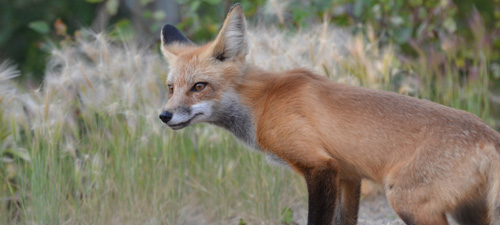Living with Wildlife
Living with Wildlife

Handling Conflicts
There are many resources available to help if you are experiencing conflicts with wildlife. If you have conflict issues involving big game species, you should contact your local Colorado Parks and Wildlife office. Big game species include deer, elk, pronghorn, sheep, goats, bear, and moose. Before calling, read the appropriate articles, to learn of ways you can reduce the potential for conflicts with wildlife.
If a wildlife conflict poses immediate danger for the animal or people in the area, call your local CPW office or law enforcement agency. Please do not call if the conflict is simply "nuisance" in nature.
If you have nuisance wildlife issues that cannot be resolved, please check the yellow pages in your phone book under Pest Control. Again, read the pertinent articles below before calling; you may be able to resolve problems on your own.
Avoiding Conflicts
As cities along the Front Range and throughout Colorado grow, new or expanding subdivisions impact wildlife habitat. Wild animals are often displaced by development. Some species are able to live in nearby open spaces, parks, undeveloped parcels of land, river bottoms, and on or near bodies of water. Others have adapted well to urban living; skunks and raccoons, in particular, seem to thrive in and near cities.
In most situations, people and wildlife can coexist. The key is to respect the wildness of wildlife. "Wildlife" is just that—wild. Most dangerous and potentially harmful encounters occur because people fail to leave the animals alone. Wildlife should not be harassed, captured, domesticated or fed. Intentional or inadvertent feeding is the major cause of most wildlife problems, and it is illegal to feed deer, bighorn sheep, mountain goats, pronghorn, and elk in Colorado.
Be Bear Aware
Do Your Part to Keep Bears Wild
Today, bears are sharing space with a growing human population. Curious, intelligent, and very resourceful, black bears will explore all possible food sources. If they find food near homes, campgrounds, vehicles, or communities, they’ll come back for more. Bears will work hard to get the calories they need, and can easily damage property, vehicles, and homes. Bears that become aggressive in their pursuit of an easy meal must often be destroyed.
Every time we’re forced to destroy a bear, it’s not just the bear that loses. We all lose a little piece of the wildness that makes Colorado so special. So please, get the information you need, and share it with your friends, neighbors, and community.
Please do your part to keep bears wild.
When Mountain Lions Meet People
Mountain lions are generally calm, quiet, and elusive. They tend to live in remote, primitive country with plentiful deer and adequate cover. Such conditions exist in mountain subdivisions, urban fringes, and open spaces. Recently, the number of mountain lion/human interactions has increased. This increase is likely due to a variety of reasons, such as:
More people moving into lion habitat
Increase in deer populations and density
Presumed increase in lion numbers and expanded range
More people using hiking and running trails in lion habitat
A greater awareness of the presence of lions.
If You Encounter a Mountain Lion
People rarely get more than a brief glimpse of a mountain lion in the wild. Lion attacks on people are rare, with fewer than a dozen fatalities in North America in more than 100 years. Most of the attacks were by young lions, perhaps forced out to hunt on their own and not yet living in established areas. Young lions may key in on easy prey, like pets and small children.
No studies have been done to determine what to do if you meet a lion. However, based on observations by people who have come upon lions, some patterns of behavior and response are beginning to emerge. With this in mind, the following suggestions may be helpful.
Remember: Every situation is different with respect to the lion, the terrain, the people, and their activity.
- Go in groups when you walk or hike in mountain lion country, and make plenty of noise to reduce your chances of surprising a lion. A sturdy walking stick is a good idea; it can be used to ward off a lion. Make sure children are close to you and within your sight at all times. Talk with children about lions and teach them what to do if they meet one.
- Do not approach a lion, especially one that is feeding or with kittens. Most mountain lions will try to avoid a confrontation. Give them a way to escape.
- Stay calm when you come upon a lion. Talk calmly and firmly to it. Move slowly.
- Stop or back away slowly, if you can do it safely. Running may stimulate a lion's instinct to chase and attack. Face the lion and stand upright.
- Do all you can to appear larger. Raise your arms. Open your jacket if you're wearing one. If you have small children with you, protect them by picking them up so they won't panic and run.
- If the lion behaves aggressively, throw stones, branches or whatever you can get your hands on without crouching down or turning your back. Wave your arms slowly and speak firmly. What you want to do is convince the lion you are not prey and that you may in fact be a danger to the lion.
- Fight back if a lion attacks you. Lions have been driven away by prey that fights back. People have fought back with rocks, sticks, caps or jackets, garden tools and their bare hands successfully. Remain standing or try to get back up!
Who Do You Call?
Colorado Parks and Wildlife is responsible for managing, conserving, and protecting wildlife. Your concerns about wildlife are our concerns as well.
If you have an encounter with a lion or an attack occurs, immediately contact the Division of Wildlife, Monday through Friday, 8am-5pm, as listed below. Before or after these hours, contact the Colorado State Patrol or your local Sheriff's department.
To report a sighting, please contact the Division during normal business hours. Your information is very valuable to us.
CPW Headquarters (Denver): (303) 297-1192
Northeast Region CPW Office (Denver): (303) 291-7227
West Region CPW Office (Grand Junction): (970) 255-6100
Southeast Region CPW Office (Colorado Springs): (719) 227-5200
Southwest Region CPW Office (Durango): (970) 247-0855
~Courtesy Colorado Parks and Wildlife
Selling Your Home?
Get your home's value - our custom reports include accurate and up to date information.




